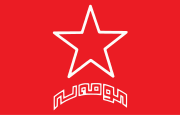
Back كومله Arabic كومله ARZ Komala Catalan حیزبی کۆمەڵەی کوردستانی ئێران CKB Komala Iranske Kurdistan parti Danish Komalah German Komala Esperanto حزب کومله کردستان ایران Persian Iranin Kurdistanin Komala-puolue Finnish Komala French
35°24′25″N 45°27′57″E / 35.4069°N 45.4657°E
Komala | |
|---|---|
 | |
| Abbreviation | KPIK |
| Leader | Abdullah Mohtadi[2] |
| Founded | 2000 |
| Split from | Komalah (CPI) (2000) |
| Headquarters | Sulaymaniyah, Kurdistan Region |
| Membership (2017) | <1,000 (estimate)[3] |
| Ideology | Social democracy Kurdish minority interests |
| Political position | Centre-left to left-wing |
| National affiliation | Congress of Nationalities for a Federal Iran |
| International affiliation | Socialist International (observer) Progressive Alliance UNPO |
| Colors | Red |
| Party flag | |
 | |
| Website | |
| Komala | |
The Komala Party of Iranian Kurdistan (Kurdish: كۆمهڵهی شۆڕشگێڕی زهحمهتكێشانی كوردستانی ئێران, romanized: Komełey Şorrişgêrrî Zehmetkêşanî Kurdistanî Êran, lit. 'Society of Revolutionary Toilers of Iranian Kurdistan'), commonly shortened to Komalah (Kurdish: Komełe; Persian: کومله), is a social-democratic[4][5][6][7][8] ethnic party of Kurds in Iran. Formerly with Marxist-Leninist and communist ties,[9][10][11] the Komalah is a well established party with a history of more than five decades. The Komala party's headquarters are presently in the Kurdistan Region of Iraq. They have an armed wing that has a history of leading the Kurdish resistance. The Komalah was advocated for anti-imperialism and Kurdish self-determination.[2]
The group is classified as a terrorist organization by Iran and Japan. Since 2018, it is a registered lobby in the United States.
Komala has been engaged in guerrilla warfare against the Iranian government, notably during the 1979 Kurdish rebellion and the Iran–Iraq War. It was also involved in armed conflict against the Democratic Party of Iranian Kurdistan (KDPI) during the 1980s and early 1990s.[12] After a long time ceasefire, in 2017 the organization declared to have resumed armed conflict with Iran.[3]
- ^ Detsch, Jack (2 October 2018), "Kurdish rebels join anti-Iran lobbying fray", Al-Monitor, archived from the original on 2 October 2018, retrieved 30 March 2020
- ^ a b Rodi Hevian (Summer 2013). "THE MAIN KURDISH POLITICAL PARTIES IN IRAN, IRAQ, SYRIA, AND TURKEY: A RESEARCH GUIDE". Middle East Review of International Affairs. 17 (2). Herzliya, Israel: Rubin Center for Research in International Affairs. Archived from the original on 2017-03-28. Retrieved 2018-05-22.
- ^ a b Cite error: The named reference
Milburnwas invoked but never defined (see the help page). - ^ Department of Justice and Police (FDJP) Pages 81 and 82
- ^ Trouw
- ^ Neurink, Judit (January 25, 2009). "Dromen aan de grens". Trouw.
- ^ "عبدالله مهتدی: از تغيير قانون اساسی بدون خشونت و خونريزی دفاع می کنيم". BBC News فارسی. June 17, 2010.
- ^ "Komala's Beliefs". komalainternational.org.
- ^ Kazemzadeh, Masoud (2009). "U.S.–Iran Confrontation in the Post-NIE World: An Analysis of Alternative Policy Options". Comparative Strategy. 28 (1): 14–27. doi:10.1080/01495930802679736. ISSN 1521-0448. S2CID 154745287.
- ^ Azeez, Govand Khalid (2019). "The "Kurd" between capitalist-statist nationalism and class conflict". Critique. 47 (3): 411–432. doi:10.1080/03017605.2019.1644724. ISSN 1748-8605. S2CID 201367012.
- ^ Akbarzadeh, Shahram; Shahab Ahmed, Zahid; Laoutides, Costas; Gourlay, William (2019). "The Kurds in Iran: balancing national and ethnic identity in a securitised environment". Third World Quarterly. 47 (3): 1145–1162. doi:10.1080/01436597.2019.1592671. ISSN 1360-2241. S2CID 159392674.
- ^ Hussein Tahiri (2007). The Structure of Kurdish Society and the Struggle for a Kurdish State. Bibliotheca Iranica: Kurdish studies series. Vol. 8. Mazda Publications. p. 144. ISBN 9781568591933.
© MMXXIII Rich X Search. We shall prevail. All rights reserved. Rich X Search